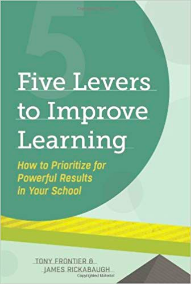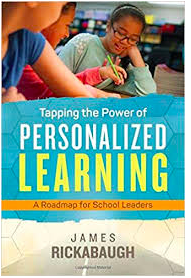Dr. Jim Rickabaugh serves as the Senior Advisor to the Institute for Personalized Learning, an education innovation lab dedicated to the transformation of public education. Jim formerly served as the Director of the Institute for six years and as a superintendent in several districts in Wisconsin and Minnesota.
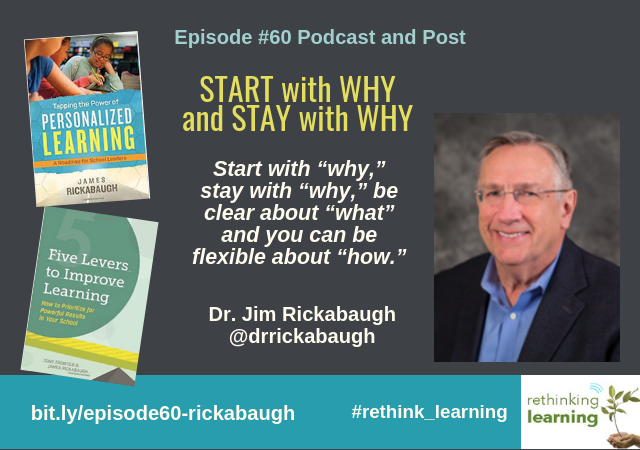
Podcast: Play in new window | Download
Subscribe: Spotify | TuneIn | RSS
Jim is the author of Tapping the Power of Personalized Learning: A Roadmap for School Leaders and co-author of Five Levers To Improve Learning: How To Prioritize For Powerful Results In Your School. I have been fortunate to participate in several summits with Jim, attend his sessions at conferences, and collaborate on blogs about personalized learning. I learned some new things about Jim in the podcast. Enjoy!
You and your family
We are a family of educators. My wife, Lynn, has been a math tutor for a long time and so supportive of the work I’m doing. Our oldest son, Jay, with a newly minted Ph.D., is a professor at Appalachian State University. Our daughter, Christine, is an early childhood educator. I have spent more than 45 years in education with more than 20 years as a superintendent. I loved that. The work I’ve done for the last ten years around personalized learning has actually become all consuming and a fun journey.
What it was like for you as a student/learner
I tend to be an achiever. For me, a school was all about if a task or challenge was set up, I would go after it. When I think back to my experiences in education, what was missing often was the connection to purpose. Rarely, do I recall a specific or compelling purpose around learning? Being an achiever, my focus typically was around doing well on the test and getting good grades. I was fortunate to do well most of the time. The downside of that was how much I forgot because I learned it for the test, not for its inherent benefit or for other value it brought to me. Not that I forgot everything, but I saw the same thing happening with my students.
Jim Rickabaugh: “Getting Learning Right the First Time, Every Time”
When we learn for the task if that’s the driver or if we say “you need to know this will be on the test” and the test is over, too often what was learned is let go. It’s an unfortunate consequence for learning. The sad part is that even the act of learning tended to be very linear and focused what was going to be on the test. In the process, we ignored and failed to explore so much that would have been interesting, compelling, and enriching. No one ever thought to stop and talk about why we were learning that was value for us. Every once in a while, something would come along like a project or a concept that was so powerful that it transformed all of that and become a really meaningful thing. Unfortunately, that experience was more the exception that it was the rule.
Your journey as an educator
I’m the first educator among my parents and siblings. The choice to go into education was driven by two things. I wanted to make a difference in children’s lives and two there were educators I admired who were brilliant people who impacted me. One, in particular, was in eighth grade. We were doing a project exploring careers. I was having difficulty finding a topic, and my teacher, Mr. David Kitch, said to me, “Jim, you really should think about going into education. I think you’d make a great teacher.” I admired Mr. Kitch as a great teacher, and if he thinks I would make a great teacher, I should pay attention to that. 25 years later, I was visiting the school district I attended and Mr. Kitch was retiring that year. I was so appreciative of his encouragement and advice that I took time to call him and thank him. Mr. Kitch remembered me but didn’t remember the comment and was shocked that it made such an impact for me. For me, it was a driving force because he was such a brilliant teacher.
If teachers only knew how much they made a difference in children’s lives, they would be absolutely humbled. Our influence becomes integrated into who they are, that they might even separate it. It is true that educators rarely know the full impact that they have on the students’ lives they touch. For many students who don’t have the support system at home, educators are their support system.
Your journey as a teacher and administrator
I taught history and Spanish in a small high school in Wisconsin near Madison. Just before I graduated from college, one of my professors who I respected said, “so to be really clear, your graduation is not the end, it is the beginning. You might start working on your masters immediately. If you don’t, life happens and it will be more difficult later.” So my first year, I worked and started working on my masters and continued working while I worked on my Ph.D. while I was a teacher. I worked at that school for four years and then moved to the Chicago suburbs as a dean of students handling mostly discipline issues. I learned a lot but I found my perspective about students was too narrow and unhealthy. So I pushed on to become a building administrator, then joined the district office as head of the curriculum, and then became superintendent at a suburb of Milwaukee. After that, I became superintendent of a district in Minnesota and then went back to Wisconsin to become superintendent of Whitefish Bay School District until 2010.
AEI Speakers: Jim Rickabaugh
Starting the Institute for Personalized Learning (https://institute4pl.org/)
There were a group of superintendents scratching our heads with two observations. One observation was that educators were working under more stress, pressure, and working harder than any of us could recall in our careers. Yet, we’re still not reaching so many kids. Our conclusion was that it is not that educators don’t care. The second observation was that in 2010 we were continuing to get more money for schools, but we found ourselves continually cutting programs. We committed to spending a year to see if anyone had figured out this issue. In 2010, people thought “Personalized Learning” was computer learning. We read everything and talked to everyone we knew. Ultimately, we came to a very obvious conclusion.
The problem is not that people are working hard enough and the problem isn’t money. It’s that we have a school design that is not aligned to what we’re asking schools to do. All learning is personal, but we have a system as if it is a corporate activity.
 Our question was: “What would happen if we actually started the design process looking at it through the eyes of a learner instead of looking at it through the curriculum or other structural elements.”
Our question was: “What would happen if we actually started the design process looking at it through the eyes of a learner instead of looking at it through the curriculum or other structural elements.”
So it turned out that learning has always been personal. We knew that. We practiced that up until the point when we needed to prepare workers for industry and assembly lines. We asked ourselves how would we engage learners if we didn’t have the system we have? Suddenly, there are all kinds of really good options that engaged learners that were not engaged in the current system in far better ways. We ended up writing a white paper, Transforming Public Education: A Regional Call to Action, on this topic that is still on our website. We were lucky that CESA1 (Cooperative Education Service Agency) was willing to put money behind this for the first two years and then see if there was enough momentum to keep it going. It continues to grow by shifting into a pay-as-you-go model and operates on services we provide using the resources they had. Thankfully, we are coming up on the 10th year and there are over 60 formal memberships and supporting over 100 projects around the Midwest. There were 500 people from 13 different states represented at our last convening.
It’s not always easy, but if people make those design decisions on the front end, then you are less likely to let it go later. Too often, good ideas have been left behind because the funding ran out. Not that the ideas weren’t good. It didn’t matter. The idea is for the each of us to own our learning and the system needs to support that process.
What Personalized Learning looks like
There is always a mystery to learning and still confusion around personalized learning. That’s why the Institute continues and we are constantly surprised by what it does for the lives of children. We partnered with a research team at the University of Wisconsin, Madison to visit schools involved in personalizing learning. They had a question for us that they were struggling with: “Every place we go where this work is going on, why do they all look different?” They asked us about fidelity to the protocol, and we came up with it being fidelity to purpose. When you are really clear that we’re trying to develop capable learners, we’re promoting ownership and agency. These discussions really pushed our thinking. This idea of fidelity to purpose brings passion to our work.
*****
This is Barbara: There is more so make sure you listen to the rest of the podcast to discuss his books and his latest venture: you learn purpose for learning (Start and Stay with the Why)
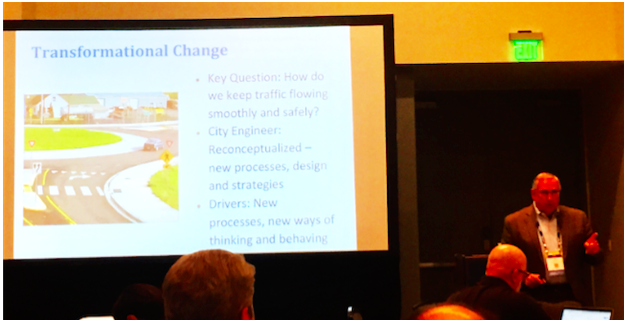
A picture at the iNACOL 2018 conference during Jim’s presentation on change
*****
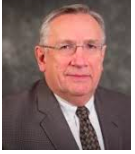 Dr. Jim Rickabaugh serves as the Senior Advisor to the Institute for Personalized Learning, an education innovation lab dedicated to the transformation of public education. The Institute serves a growing number of member school districts engaged in personalizing learning and is a part of the multi-state Innovation Lab Network coordinated by the Council of Chief State School Officers (CCSSO).
Dr. Jim Rickabaugh serves as the Senior Advisor to the Institute for Personalized Learning, an education innovation lab dedicated to the transformation of public education. The Institute serves a growing number of member school districts engaged in personalizing learning and is a part of the multi-state Innovation Lab Network coordinated by the Council of Chief State School Officers (CCSSO).
Jim formerly served as the Director of the Institute for six years and as a superintendent in several districts in Wisconsin and Minnesota. Dr. Rickabaugh was Wisconsin Superintendent of the Year in 2008 and Minnesota Superintendent of the Year in 1996. He is a member of the boards of the Wisconsin Education Business Roundtable and the Innovative Schools Network and is a member of the Advisory Board of the Midwest Comprehensive Center. He received the Excellence in Educational Leadership Award in 2005 from the University Council for Educational Administration and a lifetime achievement award from the Master Teacher in 2010.
Dr. Rickabaugh is the author of Tapping the Power of Personalized Learning: A Roadmap for School Leaders focused on helping principals and other educational leaders to engage their staffs in designing and implementing personalized learning ecosystems. Jim is also a co-author of Five Levers To Improve Learning: How To Prioritize For Powerful Results In Your School. An engaging speaker, Jim has presented on personalized learning at several national conferences including the Annual Visible Learning Conference, ASCD Annual Conference, AESA Annual Conference and iNACOL Blended and Online Learning Symposium, among others.
Senior Advisor, Institute for Personalized Learning
Twitter: @drrickabaugh
Resources:
Placing Learners at the Center Article
Tapping the Power of Personalized Learning – ASCD 2016
Keys to Implementing Personalized Learning as a Leader: An Interview with Dr. James Rickabaugh
*****
Interested in checking out more of the Rethinking Learning podcasts and reflections, click on the podcast tab at the top, the logo below, or go to https://barbarabray.net/podcasts/
For more information about Barbara’s new book, Define Your WHY, go to this page or click on the image of the book for resources, questions, and links.



